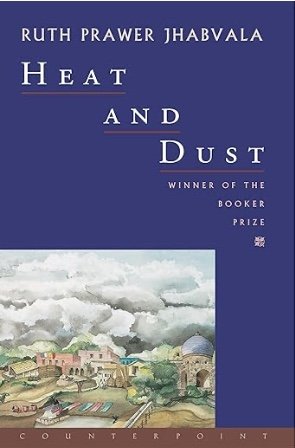Heat and Dust by Ruth Prawer Jhabvala (Counterpoint)
“Shortly after Olivia went away with the Nawab,” her abandoned husband, an English bureaucrat who was “upright and just” met his second wife. She was from a family of “cheerful women with a sensible and modern outlook on life,” ones who became fascinated by Olivia only after they became elderly widows. They told the scandalous story to the second wife’s granddaughter, augmenting the details with Olivia’s letters and journals that provided details of this shocking liaison with an Indian prince. The granddaughter, a woman with so little personality of her own that she narrates this novel without once vouchsafing her own name, takes Olivia’s private papers and follows in her footsteps to India forty years afterward.
She’s here to “do research,” she claims but instead she seems eager to lay claim to Olivia’s life. The Raj, however, is a crumbling memory. The Europeans who flock to India in the Sixties are a whole other species from the British who held sway over the country in the 1920’s. While Olivia was surrounded by solid and morally upright bastions of the Empire, her follower finds her fellow countrymen to be “a derelict lot” who congregate in the yard of the local guesthouse, looking like “souls in hell.”
When she ventures to the palace that became Olivia’s home, she finds an empty shell with bits of discarded furniture. The Nawab’s descendants have abandoned it to live in London, disdaining its 19th Century discomforts in favor of 20th Century plumbing. However, through Olivia’s account of its romantic past, the narrator does her best to find those same details in her own experience of India.
But Olivia was pretty and charming and silly, while the narrator is homely and passive and imitative. While Olivia was overwhelmed by a dashing aristocrat who was an “irresistible force of nature,” her follower drifts into satisfying the sexual needs of an Englishman who claims to be a holy man. She then becomes pregnant by her Indian landlord. There is no true parallel between Olivia and the woman who struggles to assume her adventurous life in a place where that sort of life no longer exists.
The only similarity is one that was presented by a Major who was a contemporary of Olivia’s. For those who love India, the dangers of the country’s many beauties makes them vulnerable. “India always finds the weak spot and presses on it,” he warned. Olivia would never have listened to his words and her follower ignores them, eager for the immersion that she achieves in the cheapest way possible.
It’s a surprise to many that Ruth Prawer Jhabvala was not in fact Indian by birth. The daughter of an affluent Jewish couple who fled to England from Hitler’s Germany, she married an Indian architect and made her home in New Delhi. She lived in India, raising her family and writing novels until 1975 when she and her husband left to live in New York. She is the only writer to receive both the Booker Prize and an Academy Award, earned when she joined the team of Merchant and Ivory as a screenwriter.
Although her reputation was made by writing about the subcontinent, Jhabvala said her background as a British-educated German-born European made her “ill at ease with India.” That analytical separation is evident in Heat and Dust, making it a scathing examination of cultural appropriation and the people who profit from it.~Janet Brown
.
